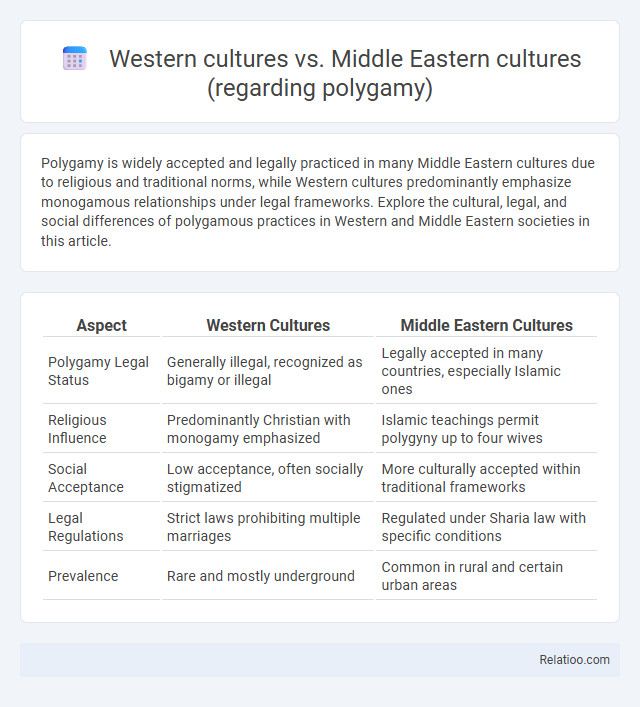Polygamy is widely accepted and legally practiced in many Middle Eastern cultures due to religious and traditional norms, while Western cultures predominantly emphasize monogamous relationships under legal frameworks. Explore the cultural, legal, and social differences of polygamous practices in Western and Middle Eastern societies in this article.
Table of Comparison
| Aspect | Western Cultures | Middle Eastern Cultures |
|---|---|---|
| Polygamy Legal Status | Generally illegal, recognized as bigamy or illegal | Legally accepted in many countries, especially Islamic ones |
| Religious Influence | Predominantly Christian with monogamy emphasized | Islamic teachings permit polygyny up to four wives |
| Social Acceptance | Low acceptance, often socially stigmatized | More culturally accepted within traditional frameworks |
| Legal Regulations | Strict laws prohibiting multiple marriages | Regulated under Sharia law with specific conditions |
| Prevalence | Rare and mostly underground | Common in rural and certain urban areas |
Historical Origins of Polygamy in Western and Middle Eastern Societies
Polygamy in Middle Eastern societies has roots in Islamic law and tribal customs, where it often served social and economic functions such as alliance-building and ensuring lineage continuity. In contrast, Western cultures historically favored monogamy due to Judeo-Christian religious doctrines and Roman legal systems that emphasized marital exclusivity. The divergent origins reflect how religious, legal, and social frameworks shaped family structures differently across these regions.
Legal Perspectives: Monogamy vs. Polygamy
Western cultures predominantly enforce monogamy through legal frameworks, considering polygamy illegal and subject to criminal penalties. Middle Eastern cultures exhibit diverse legal perspectives, where several countries legally recognize polygamous marriages under Islamic law, allowing men to have multiple wives with specific regulations. Legal systems in these regions reflect cultural and religious influences, creating distinct approaches to marriage rights, family structures, and inheritance laws.
Religious Views on Polygamy: Christianity and Islam Compared
Christianity largely prohibits polygamy, emphasizing monogamous marriage as reflected in biblical texts such as the New Testament's teachings of one man and one woman. Islam permits polygamy under specific conditions, allowing a Muslim man to have up to four wives simultaneously, provided he can treat them all justly, as outlined in the Quran (Surah An-Nisa 4:3). Western cultures, predominantly influenced by Christian doctrine, legally restrict polygamous marriages, whereas many Middle Eastern societies incorporate Islamic allowances for polygamy into their legal and cultural frameworks.
Social Stigma and Acceptance of Polygamous Relationships
Polygamy faces significant social stigma in most Western cultures, where monogamous relationships are legally and socially dominant, often viewed as a standard for family structures. In many Middle Eastern cultures, polygamy is more socially accepted due to religious and traditional practices, though it remains regulated and sometimes controversial within different communities. The acceptance of polygamous relationships varies widely, with social norms and legal frameworks deeply influencing perceptions of family legitimacy and gender roles in each region.
Gender Roles and Family Structures
Western cultures predominantly emphasize monogamous family structures where gender roles are increasingly fluid, promoting equality and shared responsibilities between partners. In contrast, many Middle Eastern cultures historically practice polygamy, with distinct gender roles often placing men as providers and women as caretakers within extended family systems. Polygamy in these regions tends to reinforce patriarchal family hierarchies, affecting legal rights, inheritance, and social status among spouses and offspring.
Economic Factors Influencing Marital Practices
In Western cultures, economic factors such as dual-income households and high living costs tend to promote monogamous marriages, as managing multiple spouses can become financially burdensome. In contrast, many Middle Eastern cultures historically accommodate polygamy, partially enabled by wealth distribution systems where affluent men can support multiple wives, reflecting socio-economic status and tribal alliances. Polygamy's economic sustainability often hinges on resource availability and inheritance norms, influencing familial structures and social hierarchy in varying cultural contexts.
Media Representation and Cultural Narratives
Media representations of polygamy often reinforce stereotypes in Western cultures by portraying it as exotic or oppressive, whereas Middle Eastern cultures experience more nuanced narratives rooted in religious and social contexts. Your understanding is shaped by these cultural narratives, which highlight differing legal frameworks and societal attitudes toward polygamy across regions. These divergent portrayals influence public perception and policy debates, underscoring the importance of contextual media literacy.
Impact on Children: Psychological and Social Aspects
In Western cultures, where monogamy is the normative legal and social standard, children from polygamous families often face psychological challenges such as identity confusion and social stigma. Middle Eastern cultures that permit polygamy may provide stronger communal support systems which can mitigate some social impacts but still present complex family dynamics affecting children's emotional development. Research indicates that children's psychological well-being in polygamous families is heavily influenced by factors like parental attention distribution and socio-economic conditions rather than polygamy alone.
Trends and Changes: Modern Attitudes Toward Polygamy
Western cultures have largely moved away from polygamy, emphasizing monogamous relationships under legal frameworks that reflect modern social values. In contrast, some Middle Eastern cultures continue to permit polygamy, though there is growing debate and changing perceptions influenced by global human rights discussions and modernization. Your understanding of these trends reveals a shift toward equal marriage rights and evolving cultural norms impacting legal and social acceptance of polygamous relationships.
Cross-Cultural Interactions and Globalization Effects
Polygamy remains legally and socially accepted in many Middle Eastern cultures, deeply rooted in religious and historical traditions, while Western cultures predominantly uphold monogamous relationships influenced by secular legal frameworks. Cross-cultural interactions have increased awareness and dialogue surrounding polygamy's ethical, legal, and social implications, influencing policy debates and personal attitudes worldwide. Your understanding of these complex dynamics can enhance global cooperation and respect for diverse cultural practices amid ongoing globalization effects.

Infographic: Western cultures vs Middle Eastern cultures (regarding polygamy)
 relatioo.com
relatioo.com